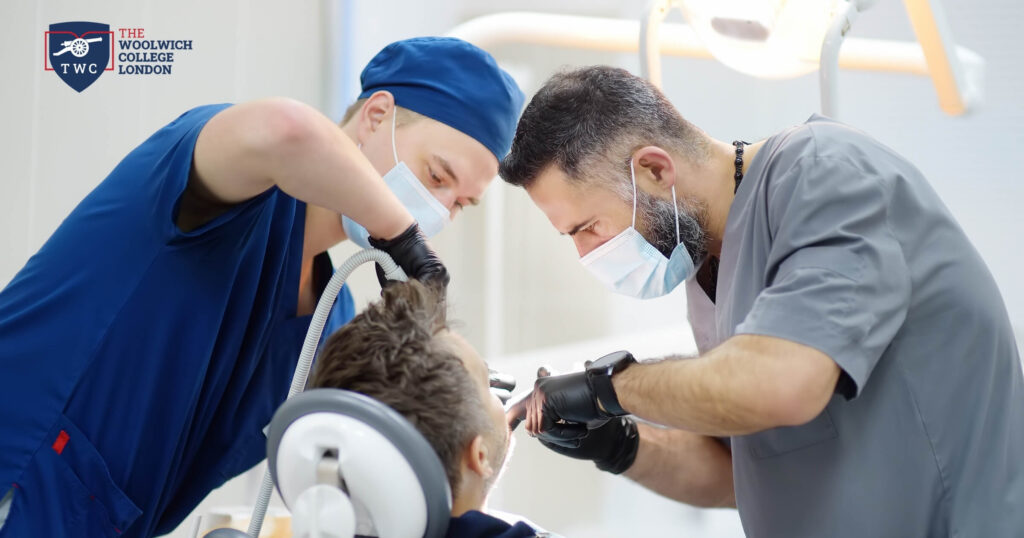Ever wondered, “What is a dental nurse?” Imagine a vital team member in a dental practice who keeps everything running smoothly—from calming nervous patients to making sure instruments are sterilised. A dental nurse works alongside dentists, hygienists and therapists, providing clinical and administrative support. They’re the backbone of patient care, infection control and daily clinic life.
In the UK, over 70,000 registered dental nurses support oral healthcare, with demand growing as NHS and private practices expand. Whether you’re drawn to patient interaction, technical tasks, or a stable healthcare career, understanding the dental nurse job description, qualifications, and career progression is the first step. Let’s break down what this role really means, how to qualify, and why it’s a rewarding choice—especially in cities like London, where opportunities are plentiful.
Key Highlights:
- Role: Clinical support, patient care, and clinic management.
- Qualifications: GCSEs, accredited courses (e.g., NEBDN Diploma), and GDC registration.
- Career Growth: From entry-level roles to specialisations like orthodontics or teaching.
By the end of this guide, you’ll know exactly how to start your journey, what skills you’ll need, and how much you could earn. Ready to dive deeper? Let’s explore what makes dental nursing a career worth smiling about.
What Does a Dental Nurse Do? Roles and Responsibilities
From sterilising instruments to calming anxious patients, what is a dental nurse truly about? It’s a role that blends technical precision with compassionate care, making them indispensable to modern dentistry.
Their dental nurse duties stretch far beyond handing tools to dentists—they’re multitaskers ensuring safety, comfort, and efficiency. Let’s unpack their core responsibilities.
Assisting Dentists During Procedures
You’ll prepare instruments, mix materials (like fillings), and operate suction devices to keep patients’ mouths clear. During complex treatments—root canals, extractions, or crowns—you’ll anticipate the dentist’s needs, reducing delays. Precision here is key: 92% of dentists say skilled chairside support improves patient outcomes.
Patient Care and Communication
Ever felt nervous at the dentist’s? Dental nurses calm fears by explaining procedures in simple terms. They’ll monitor vital signs, adjust chair positions, and even hold a patient’s hand during injections. Empathy isn’t optional—it’s part of the dental nurse job description.
Sterilisation and Infection Control
Did you know that 1 in 10 infections in healthcare settings come from poor sterilisation? Dental nurses follow strict protocols to clean tools, disinfect surfaces, and manage waste. Your vigilance keeps everyone safe, from patients to staff.
Administrative and Clinic Management
From updating patient records to booking appointments, you’ll handle behind-the-scenes tasks. Stocking supplies, tracking inventory, and ensuring compliance with health regulations also fall under dental nurse responsibilities.
Supporting Dental Health Education
You’ll teach patients how to brush properly or care for braces. In schools or community programmes, you might lead workshops on oral hygiene—turning knowledge into actionable habits.

What are The Benefits of Becoming a Dental Nurse in the UK?
Choosing a career as a dental nurse isn’t just about a job—it’s about joining a profession with lasting rewards. Here’s why thousands in the UK choose this path:
Stable Career in Healthcare
Healthcare never sleeps, and dental nursing is no exception. With the NHS employing over 40,000 dental nurses and private practices expanding, demand is steady. Even during economic downturns, oral health remains a priority—making this role recession-resilient.
Flexible Working Hours
Need a job that fits around family or studies? Many dental nurses work part-time, weekends, or term-time. Some even opt for agency roles, picking shifts that suit their schedules. Imagine earning while balancing other life goals.
Opportunities for Specialisation
Boredom won’t be an issue. After qualifying, you could focus on orthodontics, pediatric dentistry, or oral surgery. Specialising often boosts earnings—experienced orthodontic nurses in London earn up to 20% more than generalists.
Rewarding Patient Interaction
If you thrive on helping others, this role delivers. From soothing anxious children to guiding elderly patients through aftercare, you’ll build trust and see tangible impacts on their wellbeing. It’s not just a job, it’s a chance to make smiles brighter.
Pathway to Advanced Dental Roles
Think of dental nursing as a launchpad. With experience, you could train as a hygienist, therapist, or even a practice manager. Over 15% of dental nurses transition into higher-paying roles within a decade, according to the General Dental Council.

What are the Different Types of Dental Nursing Careers?
A dental nurse isn’t confined to one setting—your skills can open doors across diverse environments. Let’s explore the paths available, including how dental nurse qualifications, training, and location (like London) shape these roles.
General Practice Dental Nurse
This is where most begin. In a dental surgery or clinic, you’ll handle the core dental nurse duties: assisting with fillings, taking X-rays, and managing appointments. It’s ideal for building foundational skills. Over 80% of UK dental nurses work in general practice, with salaries starting at £20,000 (rising to £28,000 with experience).
Hospital Dental Nurse
Here, you’ll support complex procedures like oral surgery or cancer treatments. Hospital roles often require additional certifications (e.g., sedation nursing) and align with NHS Band 4 pay scales (£25,000–£30,000). Perfect if you thrive in fast-paced, specialised settings.
Community Dental Nurse
Work with schools, care homes, or mobile clinics to reach underserved groups. This role emphasises dental health education, like teaching children proper brushing techniques. Salaries mirror NHS bands, with London roles often paying 10% more due to demand.
Specialist Dental Nurse (Orthodontics, Oral Surgery)
Want to focus on braces, implants, or trauma cases? Specialising boosts earning potential. For example, orthodontic nurses in London earn £26,000–£35,000. You’ll need post-qualification courses, such as the NEBDN Orthodontic Nursing Diploma—a popular option in dental nurse training courses in London.
Military or Armed Forces Dental Nurse
Serve military personnel while enjoying benefits like free training and travel. Duties include emergency care and maintaining oral health in challenging environments. Entry typically requires GDC registration and basic military training.

What is the Average Salary of a Dental Nurse?
When considering a career as a dental nurse, salary is a key factor. Earnings vary based on experience, location, and specialisation. Let’s break it down.
Average Salary in the UK (Entry-Level to Experienced)
Starting salaries for dental nurses typically range from £18,000 to £22,000. With 2–5 years of experience, you could earn £22,000–£28,000. Senior roles or those with additional qualifications can push earnings to £30,000 or more. For example, a dental nurse’s salary in London often starts higher, averaging £22,000–£25,000 for newcomers.
NHS vs. Private Sector Pay Differences
In the NHS, salaries follow Band 4 pay scales (£25,000–£30,000). Private practices may offer similar or higher pay, especially in affluent areas. However, NHS roles often come with pensions and job security, while private roles might include performance bonuses.
Impact of Location on Earnings
Location matters. In cities like London, salaries are 10–15% higher due to demand and living costs. For instance, a dental nurse’s salary in London averages £26,000–£32,000, compared to £20,000–£25,000 in smaller towns.
Enhancing Earnings Through Specialisations
Specialising can significantly boost income. Orthodontic or sedation nurses earn £26,000–£35,000, while those in oral surgery or pediatric dentistry often command higher rates. Post-qualification courses, like those offered in dental nurse training courses London, are a smart investment.
Career Growth and Demand in the UK
The UK needs dental nurses. With over 70,000 registered professionals and growing demand in both NHS and private sectors, job security is strong. Career progression—like becoming a senior nurse or transitioning to dental hygiene—can further increase earnings.

How to Become a Dental Nurse in London?
Becoming a dental nurse in London involves structured steps—from meeting entry requirements to securing GDC registration. Here’s your roadmap:
Entry Requirements (GCSEs, Skills, and Attributes)
You’ll typically need GCSEs (Grade 4/C or above in English, Maths, and Science) and a passion for healthcare. Employers value empathy, teamwork, and attention to detail—skills critical for patient care and infection control. No prior dental experience? Many training providers accept school leavers or career changers.
Accredited Dental Nursing Courses (e.g., City and Guilds and NEBDN)
London offers top-tier training. The National Examining Board for Dental Nurses (NEBDN) Diploma and City & Guilds Level 3 are gold-standard qualifications. Courses like The Woolwich College’s NEBDN-accredited Diploma blend theory with hands-on practice, ensuring you’re job-ready.
Apprenticeships vs. College-Based Training
Apprenticeships let you earn while learning, spending 30+ hours weekly in a dental practice and gaining hands-on skills—ideal if you thrive in real-world settings. College-based training offers structured classroom learning (full-time or part-time), suited to those who prefer a formal schedule. Both routes require passing written exams and practical assessments, but apprenticeships blend paid work with study, while college courses focus on theory before practice. Choose apprenticeships for immediate clinic immersion or college if you want dedicated study time. Either way, you’ll qualify for GDC registration, opening doors to roles across the UK.
GDC Registration Process
After qualifying, you must register with the General Dental Council (GDC) to work legally. Submit proof of your accredited qualification, pay the £120 fee, and pass a DBS check. Over 95% of trainees achieve registration within six months of course completion.
On-the-Job Training and Exams
Even after qualifying, learning continues. Most employers provide mentorship to refine skills like radiography or sedation. You’ll also need to complete Continuing Professional Development (CPD) annually to maintain GDC registration.
What are the Career Progression Options for Dental Nurses
Understanding what is a dental nurse is just the start. As you gain experience, you’ll unlock advanced pathways like radiography or teaching—proof that this role offers far more than entry-level opportunities.
Advanced Qualifications (Radiography, Sedation)
Boost your expertise—and earnings—with post-registration courses. For example, a Dental Radiography qualification lets you take X-rays independently, while Sedation Nursing certifies you to assist in advanced procedures. These skills can lift salaries by £3,000–£5,000 annually.
Leadership Roles (Senior Nurse, Practice Manager)
With 5+ years’ of experience, you could mentor junior staff or manage clinic operations. Senior NHS roles (Band 6) pay up to £37,000, while private practice managers in London earn £35,000–£45,000. Leadership hinges on soft skills like communication and decision-making.
Transitioning to Dental Hygiene or Therapy
Ready for more clinical responsibility? Many nurses train as hygienists (cleaning teeth, applying sealants) or therapists (fillings, extractions). This requires a 2-year degree, but salaries jump to £40,000+—ideal for those seeking autonomy.
Teaching and Training Future Dental Nurses
Pass on your knowledge. Colleges like The Woolwich College London hire experienced nurses to teach accredited courses. You’ll need a teaching qualification (e.g., Level 3 Award in Education), but it’s a fulfilling way to shape the next generation.
Opportunities in Research or Public Health
Want to influence policy or improve community oral health? Roles in research institutions or public health agencies let you design educational campaigns or study treatment trends. A Public Health Diploma can open these doors.

Why Study Dental Nursing at The Woolwich College?
Ready to start a dental nurse career? The Woolwich College London is a Further Education College with over 10 years of experience in vocational training courses that offers a clear route to success. Specialising in healthcare, IT and business courses we blend theory with real-world practice so you gain skills employers want. Our NEBDN-accredited Diploma in Dental Nursing and City & Guilds Level 3 in Dental Nurse Certificate don’t just teach what is a dental nurse—they get you clinic-ready through hands-on training in infection control, patient communication and NHS compliance.
As a Further Education College, we put accessibility first. Whether you’re a school leaver or changing careers our flexible hybrid courses (online and in-person) fit around your schedule. Train in modern dental suites with industry-standard equipment, tutored by tutors who have worked in NHS hospitals and private practices. Beyond the classroom, our partnerships with London clinics secure work placements so you get a foot in the door before you graduate.
But it’s not just about the training. We’re committed to affordability, offering instalment plans and funding advice to help with financial stress. By choosing The Woolwich College London, you’re investing in a General Dental Council (GDC) recognised qualification, strong industry connections, and lifelong career support—all hallmarks of a further education college dedicated to your growth.
Here’s why we’re a top choice for aspiring dental nurses in London:
- Accredited Courses That Open Doors:
Our NEBDN Level 3 Diploma in Dental Nursing is recognised by the General Dental Council (GDC), meaning you’ll graduate ready to register and work legally. Prefer flexibility? The City & Guilds Level 3 Dental Nursing course blends online learning with hands-on clinic sessions, perfect for balancing studies with part-time work or family commitments.
- Learn From Industry Experts:
You’ll train in modern facilities using the latest dental equipment, guided by tutors who’ve worked in NHS hospitals and private practices. Their real-world insights ensure you master everything from infection control to patient communication—no outdated textbooks here.
- Job Placement Support & Industry Links:
We don’t just teach; we connect. Our partnerships with London dental clinics and hospitals help secure work placements during your course, and many graduates land roles at these sites. Need CV advice or interview prep? Our career team offers lifelong support, even after you qualify.
Contact us today to enrol—your future in dental nursing starts here.
FAQs Regarding What is a Dental Nurse
What Qualifications Do I Need to Become a Dental Nurse?
You’ll need GCSEs (Grade 4/C or above in English, Maths, and Science) and an accredited qualification like the NEBDN Diploma or City & Guilds Level 3 Certificate. Personal skills—empathy, teamwork, and attention to detail—are equally vital.
How long does it take to become a qualified dental nurse?
Most qualifications take 12–24 months. Apprenticeships combine work and study over 18–24 months, while full-time college courses (e.g., at The Woolwich College London) can take 12–18 months.
What is the difference between a dental nurse and a dental hygienist?
A dental nurse works closely with dentists during procedures, handling tools, sterilising equipment, and ensuring patient comfort, while a dental hygienist focuses on preventive care—cleaning teeth, treating gum disease, and educating patients on oral hygiene. Hygienists perform clinical tasks independently (like scaling or applying fluoride) and require a 2-year degree, whereas nurses support dentists directly and qualify through diplomas like the NEBDN. Think of it like this: nurses are the dentist’s right hand, while hygienists lead the charge in keeping smiles cavity-free.
Can I Work While Studying?
Yes! Apprenticeships let you earn while training. Many colleges, like The Woolwich College London, offer part-time or hybrid courses to fit around jobs. If you’re wondering how to manage both, check out our guide on balancing work and study effectively for practical tips.
Is the Course provided by TWC London Recognised by the GDC?
Absolutely. The Woolwich College London’s NEBDN Diploma and City & Guilds Level 3 courses are fully accredited by the GDC. Over 95% of graduates successfully register.
What Career Support Does The Woolwich College Offer?
From work placements at London clinics to CV workshops and interview coaching, TWC London provides lifelong career support. Their industry links help graduates secure roles faster.
How Much Do NHS Dental Nurses Get Paid?
NHS dental nurses are paid on the Agenda for Change (AfC) band system which is based on experience, qualifications and responsibilities. They work 37.5 hours a week including possible evenings and weekends.
NHS Dental Nurse Pay Bands:
- Band 3 (£22,000-£24,000): Entry level dental nurses, in training or newly qualified.
- Band 4 (£25,000-£30,000): Qualified dental nurses with up to 3 years experience assisting in advanced procedures.
- Band 5 (£28,000-£34,000): Dental nurse specialists or dental technicians with additional qualifications (e.g. radiography, sedation).
- Band 8a-8c (£50,000-£75,000): Managerial roles such as dental laboratory managers, managing operations and staff.
In the private sector £18,000-£35,000 with higher in London and for specialist roles like orthodontic or surgical nursing. Career progression into senior, specialist or managerial roles can increase earnings significantly.





